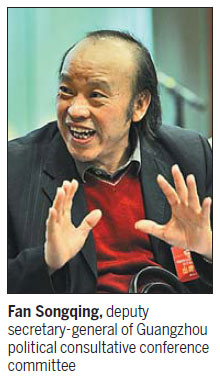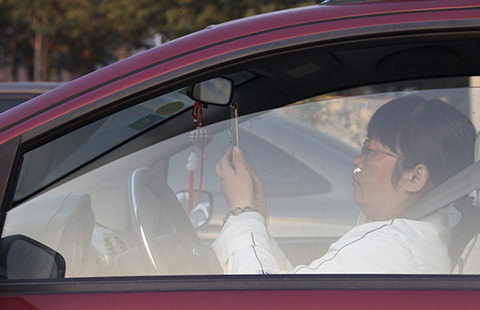Proposal to lift lid on officials' assets
By Qiu Quanlin in Guangzhou, An Baijie in Beijing and Cang Wei in Nanjing (China Daily) Updated: 2013-01-23 07:35After he revealed his assets, several local officials including Su Zhijia, chairman of Guangzhou political consultative conference committee, also expressed their willingness to publicize their families' assets.

"We should not wait for a city-wide implementation of the reporting system. If it had been put into operation earlier, there wouldn't be so many officials involved in corruption in the past few years," he said.
"As an official, I have fulfilled my responsibility by reporting my family's assets. I am going to retire soon and I will be happy when more officials follow the practice."
In his proposal, Fan also asked retired officials to be included in the reporting system.
"From the previous corruption cases, we can see that some officials have illegally earned a lot after retirement," Fan said.
"Their relatives' assets should also be publicized as some officials will transfer their illegal income to family members."
In response to Fan's proposal, Cao Jianliao, deputy mayor of Guangzhou, said he would follow suit.
"I would like to publicize my family's assets if the authorities require officials to do so," Cao said.
A group of officials from Guangzhou have been sent to Hong Kong and Macao to learn from their successful practices in disclosing officials' assets, according to Wang Xiaoling, head of the city's Party anti-graft body.
Some officials in the city's Nansha district are required to report family assets to the Party's supervision agencies after Spring Festival, which falls on Feb 10.
Wang said that not all of the district's officials are required to report their assets.
"We will learn from the practices in Hong Kong and Macao, where only around 40 percent of departments require their officials to report their assets," she added.
Under the current proposal, such information will be reported to the Party's anti-graft authorities rather than disclosed to the public, she said.
Shi Jishan, head of the Party's anti-graft body in Changchun, doubted officials could voluntarily report their assets in an honest manner.
"In the past, most officials who have been found guilty of corruption refused to admit their wrongdoing," he said. "So it would be impossible for all officials to voluntarily reveal their assets."
Nanjing's experience
The authorities in Jiangning district of Nanjing, Jiangsu province, put forward a policy requiring officials to declare personal assets as early as June 2011.
Officials in the district are required to report their savings, real estate, cars, and the business their spouses and children are engaged in before being promoted, according to the policy.
So far, a total of 198 officials from 59 workplaces in the district have completed their asset reports.
The anti-graft body will verify the declaration, and officials who conceal the assets will have their names listed before further punishment is made.
Long Xiang, head of Nanjing's anti-graft body, said the pilot program had some influence on newly promoted officials, but the asset declaration system still has some problems, including difficulties in verification and the coverage of higher-level officials.
Contact writers at qiuquanlin@chinadaily.com.cn, anbaijie@chinadaily.com.cn and cangwei@chinadaily.com.cn
- Shanghai adopts measures to control surging home prices
- Chinese railway builders help locals along African railway
- Highlights of Barcelona Games World Fair
- China biggest Dubai trade partner in H1 2016
- Chinese steel won't impact EU market: official
- Virtual reality industry boost in SW China
- Home price curbs expected to spread
- Shanghai, Beijing release draft rules on car-hailing services


















